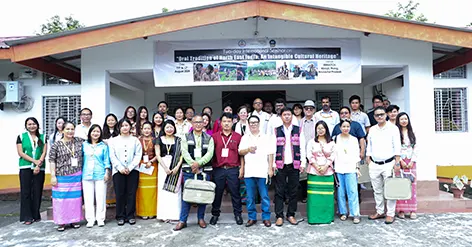[ Karyir Riba ]
ROING, 13 Aug: A two-day international seminar themed ‘Oral traditions of Northeast India: An intangible cultural heritage’ was organised by the RIWATCH Centre for Mother Languages (RCML), in collaboration with Jomin Tayeng Government Model Degree College (JTGMDC) and the Arunachal Pradesh Literary Society (APLS), at the Research Institute of World’s Ancient Traditions Cultures and Heritage (RIWATCH) here in Lower Dibang Valley district.
The seminar was organised to draw attention to the prevailing significant theories of oral traditions and their practice in tribal communities across the globe. The event also endeavoured to provide a platform for scholars with firsthand experience in studying societies that rely on oral traditions for passing down traditional knowledge, as well as to offer comparative insights into these traditions.
RIWATCH executive director Vijay Swami shared his experience about his observation on the similarities in oral traditions of various indigenous communities of different countries in the world, drawing examples from
those of New Zealand, Indonesia, Kenya, Armenia, and so on. He said that “the Vedas are the oldest unbroken oral traditions continued still today.”
“These oral traditions are packed with values, unwritten rules for social unity, and moral lessons,” he added.
Understanding the socio-cultural significance of intangible cultural heritage (ICH) at the national and international levels, the RIWATCH will soon establish a centre for ICH to document the valuable cultural heritage of Northeast India, with Arunachal Pradesh in particular, to preserve and disseminate the knowledge systems of the indigenous communities,” he informed.
APLS president YD Thongchi, who attended the programme as a guest, commended the organising institutions for hosting the international seminar and providing young scholars with the opportunity to deliberate on oral traditions.
He emphasised that “each culture and practice is unique, and the natives possess the best understanding of their own culture, making them most suitable to study the culture.”
He also stressed that, in doing so, “scholars should maintain neutrality and avoid biases to produce quality research.”
Thongchi also released the seminar’s abstract book,along with three Idu Mishmi pictorial books in the book series Iniya Idu Ekobe Chicha Ahito Jichi(Let Us Learn Idu), namely, Amuǝra (Nature and Environment), Hãwe-Tõwe(Food and Beverage) and Taphuamra (Crafts and Artefacts), published by the RCML.
Germany-based Albert Ludwig University of Friburg’s General Linguistics Chairperson Prof Uta Reinhöl delivered the keynote address on the topic ‘A linguistic exploration of Igu: The shamanic language of the Kera’a’.
Rajiv Gandhi University’s (RGU) Arunachal Institute of Tribal Studies Director Prof Simon John delivered a special lecture on ‘Understanding oral tradition in Indian context: Issues and challenges’.
Three special lectures were also delivered during the programme. Indonesia-based Tampung Penyang State Hindu College Assistant Professor Dr Suyanto MPd delivered a lecture on the topic ‘Rituals and oral traditions in Hindu kaharingan: A study of cultural practices in Kalimantan’, while RGU English Department Assistant Professors Dr Doyir Ete and Dr Bompi Riba spoke on ‘Tribal theory: Possibilities in theory and praxis’, and ‘Oral narratives through creative writing: A study on ballad form’, respectively.
Over 50 presentations were submitted by research scholars and academicians from various universities and institutes, besides independent researchers from different states of Northeast India.
The presentations addressed a wide range of topics across various themes on oral traditions of the Monpa, Adi, Nocte, Galo, Idu Mishmi, Tagin, Singpho, Tawra Mishmi, Kaman Mishmi, Apatani and Nyishi tribes Arunachal; the Mao Naga of Manipur; the Bodo and Oraons of Assam; and the indigenous community of Kalimantan, Indonesia.
The seminar was convened by JTGMDC Assistant Professor Dr Razzeko Delley, with RIWATCH executive director Swami and JTGMDC Principal Dr Milorai Modi as the patrons.
Certificates were later awarded to the participants.




